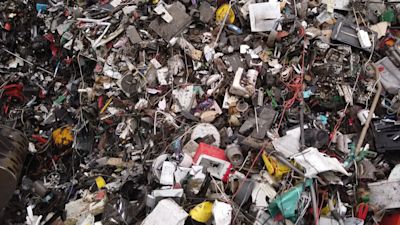Will new 'right to repair' law make it easier to fix broken electricals instead of dumping them?

ITV News Consumer Editor Chris Choi outlines the rules that could positively impact the environment
Tonnes of faulty electricals are dumped each year - and more repairing of appliances could lessen that environmental impact.
ITV’s Tonight programme has discovered plans for new rules that would require manufacturers to make fixing goods a lot easier in the future.
Exclusive research, provided to ITV Tonight by Material Focus, shows just 2% of us get electricals repaired when they go wrong. For laptops and tablets, it’s only slightly higher at 4%.
155,000 tonnes of unwanted electricals are thrown away by UK households each year.
Many people find it is cheaper to buy a new product than fix an old one. It can be hard to get spares and some manufacturers actively discourage DIY repairs.
One woman who took her kettle to a repair cafe in Cambridge, where volunteers repair items, is disappointed to hear that the item cannot be fixed due to its design
A new “right to repair” law was introduced to the UK this year, but critics have already said it is itself urgently in need of repair.
The new legislation requires manufacturers to make spares available for up to 10 years. The government claims it will prevent 1.5 million tonnes of waste a year.
The new rules only apply to dishwashers, fridges, washing machines and TVs. Smart phones, tablets, laptops and other small devices are not covered.
Now the government has told ITV it "will explore what other products can be included, to further empower consumers”.
Would manufacturers support a 'reparability' label on their appliances? Paul Hide, spokesperson for appliance manufacturers in the UK, says 'it may well happen in the future'
Tonight also talked to Paul Hide, chief executive of the Association of Manufacturers of Domestic Appliances - the main spokesperson for appliance manufacturers in the UK. We learned the industry is currently in talks with the government about introducing a new type of 'reparability' labelling.
Products would be given a score out of 10 depending on how easy they are to fix.
A similar scheme already operates in France and there are signs that manufacturers have become more motivated to make goods simpler to fix.
The UK’s appliance manufacturers say products are not deliberately designed to be difficult to repair - they’re made to optimise performance at an affordable price.
Manufacturers making appliances disposable by design is something Paul Hide, from the Association of Manufacturers of Domestic Appliances, denies
It’s important to say that nobody should attempt electrical repairs unless they know exactly what they are doing.
Tech UK, which represents firms that make many of the devices we use, says DIY fixing can lead to safety risks. It stresses that repairs should be done by trained engineers using authorised parts.
The industry says modern designs make products more durable, which stops them needing repairs in the first place.
Our search is on for the oldest products still in use.
In the Tonight programme, we meet one man who shows us how he has kept a 1970s Russell Hobbs kettle on the go - and even a GEC fridge from the 1950s.
If you still use a vintage appliance, we’d love to hear about it. Share your story by emailing consumerdesk@itn.co.uk.
Watch Repair or Replace? Britain in a Fix - Tonight on ITV, Thursday 14 October at 7.30pm. It will be available after broadcast on the ITV Hub.
For more information about how to repair and prolong the life of your electrical appliances, or how to recycle them, visit recycleyourelectricals.org.uk or therestartproject.org.